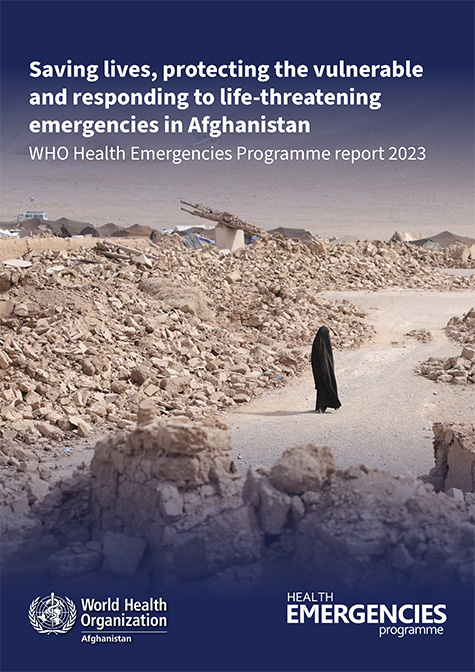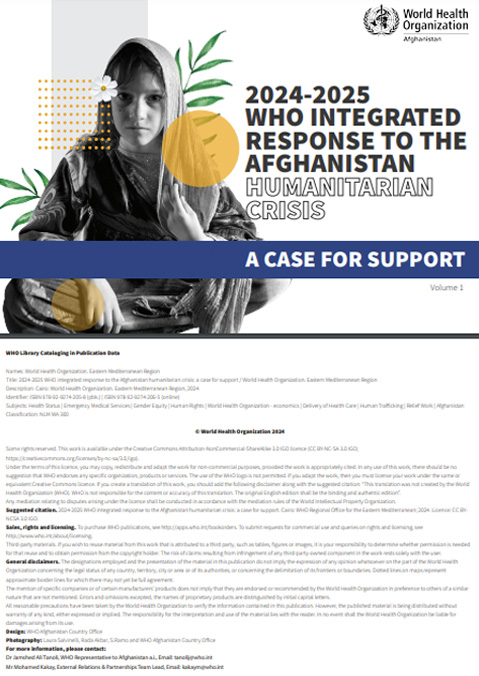31 March 2020 – Afghanistan as a country in conflict could be among one of the worst affected countries by the pandemic. Afghanistan reported the first person diagnosed with COVID-19 in late February. The individual, who has since been discharged from hospital, had recently visited Qom, Islamic Republic of Iran, one of the countries with the highest number of people diagnosed with COVID-19, where many people also lost their lives to the pandemic.
WHO has announced a pandemic due to COVID-19 and many countries have independently taken very strict and severe measures, including total lock down to slow down the spread of the virus, thereby, possibly lessening the burden on health facilities that are already overburdened with health workers working double shifts.
WHO, while alerting Member States to be prepared and vigilant, advises on detection, testing and isolation of people with COVID-19, as the main measures that could contain the virus by breaking its chain of transmission.
The first person to have COVID-19 in Afghanistan was confirmed on 24 February 2020 by the Ministry of Public Health of Afghanistan. As of end of March there were 193 people confirmed to have the disease. In response, all schools and universities, public gatherings and mosques have been closed and Herat and Kabul have been in lock down since late March until further notice.
Key concerns are the border crossing areas between Afghanistan, Islamic Republic of Iran and Pakistan where nearly 300 000 people have returned from the two countries. Spin Boldak border crossing was closed by both Afghan and Pakistani authorities on March 1 for seven days, but Afghanistan’s main border crossing with Pakistan – the Torkham crossing – and Spin Boldak now, remains open. Border crossing area with Islamic Republic of Iran also remain open.
WHO technical support to the response
Response in Afghanistan is focusing on slowing down the transmission of the virus. “WHO is closely working with Ministry of Public Health and assisting the health sector and its partners since early January regarding COVID-19 on preparedness and has massively expanded its assistance in key areas in 8 pillars as part of the WHO Phase 2 plan. WHO closely worked with Vice Presidential Task Force assisting the overall COVID-19 response of the Government of Afghanstan, together with United Nations and other partners. WHO is also actively mobilizing resources for the overall COVID-19 response. WHO projects that long-term support will be required,” said Dr Richard Peeperkorn, WHO Representative in Afghanistan.
WHO so far has supported equipping central laboratory in Kabul, the Afghan-Japan hospital (National Isolation Centre) and Herat isolation ward with beds, ventilators, oxygen concentrators, infrared thermometer, personal protection equipment, N95 masks, hand rubs, high voltage power generator, medical kits, test kits, infrared containers, and thermography cameras across the country at zonal hospitals in all regions in the country.
WHO and the International Organization for Migration are actively supporting response activities with the Ministry of Public Health to address preparedness and emergency coordination in the provinces bordering with Islamic Republic of Iran and Pakistan. WHO, together with the Health Cluster, has developed and is implementing a COVID-19 preparedness plan to complement the Ministry of Public Health's Emergency Response Plan for Coronavirus 2020. The Inter-Cluster Coordination Team in Afghanistan has agreed that the current WHO preparedness plan will be updated to cover response activities and include more intersectoral components.
Challenges
- There is limited number of laboratories, and health facilities are already overstretched across the country. Many people in rural remote areas must walk at least 2 hours to reach the nearest health facility.
- More laboratory commodities will be required, where 7 laboratory facilities are planned to be upgraded/establisehd before end of April.
- Numerous people cross Islamic Republic of Iran-Afghanistan border illegally and are at risk of missing the screening for COVID-19.













